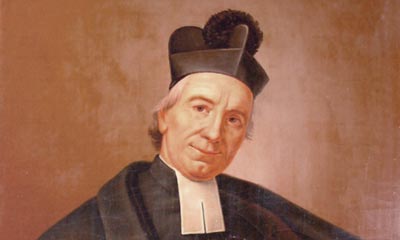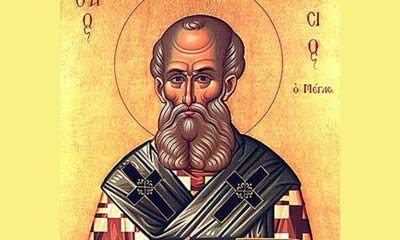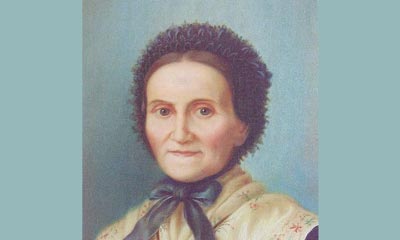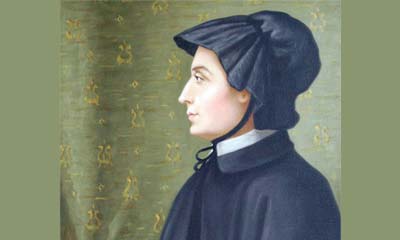May 26, 2021
Blessed Carlo Acutis
Dear Friends,
Many disenchanted Christians are convinced that today, at the beginning of the third millennium, it is no longer possible for young people to follow the path of holiness in their adolescent surroundings, unless they lock themselves up in a “bubble” that isolates them from their times and their environment. Yet Carlo Acutis proved otherwise. This young Italian, who died in 2006 at the age of 15, was praised by Pope Francis in his Apostolic Exhortation Christus Vivit (25 March 2019). A spirited and exceptionally talented young man, Acutis was outstandingly gifted in computer science. And he viewed the Eucharist as his “highway to Heaven.”
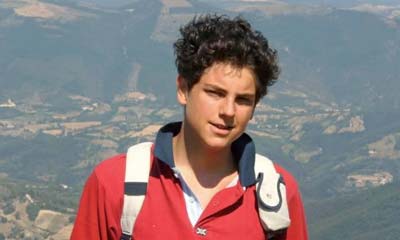 Carlo was born in London on May 3, 1991 to Andrea and Antonia Acutis, a young Italian couple whose jobs had led them to work in England at the time. His parents were not practicing Catholics; nevertheless, he was baptized by May 15, and instructed in the Catholic faith. Carlo showed a keen interest in all that surrounded him; his observant nature, associated with his capacity to take his thoughts to their logical conclusion, would become one of his main qualities. Speaking of Baptism, he said, “It is a very important thing, because it allows souls to be saved through their insertion into the Divine Life. People participating in a Baptism focus too often on the confetti, the candy, and the white robe which are part of the festivities, but they do not seek to understand the meaning of this great gift bestowed by God on humanity.” This gift is the possibility of becoming children of God (Jn 1:12) and heirs to His eternal Kingdom (see Rom 8:17).
Carlo was born in London on May 3, 1991 to Andrea and Antonia Acutis, a young Italian couple whose jobs had led them to work in England at the time. His parents were not practicing Catholics; nevertheless, he was baptized by May 15, and instructed in the Catholic faith. Carlo showed a keen interest in all that surrounded him; his observant nature, associated with his capacity to take his thoughts to their logical conclusion, would become one of his main qualities. Speaking of Baptism, he said, “It is a very important thing, because it allows souls to be saved through their insertion into the Divine Life. People participating in a Baptism focus too often on the confetti, the candy, and the white robe which are part of the festivities, but they do not seek to understand the meaning of this great gift bestowed by God on humanity.” This gift is the possibility of becoming children of God (Jn 1:12) and heirs to His eternal Kingdom (see Rom 8:17).
“The Lord would not be pleased”
The Acutis family returned to Milan in September 1991. Carlo was at once a very sociable and peaceful child. When his Polish nanny encouraged him to fight back against aggressive children, he replied: “The Lord would not be pleased if I were to respond with violence.” The family spent their summers by the sea in Centola, near Salerno. All the residents of this quiet village quickly adopted Carlo, and he befriended everyone. He recited the rosary fervently and went to daily Mass from the day of his first Communion at the age of seven. When he received Communion, his devotion impressed all those who witnessed it.
In Milan, Carlo went to school at the Tommaseo Institute run by the Marcelline Sisters. He remained faithful to daily Mass, always finding a “grown-up” to accompany him. Along the way, he would stop and chat with the doormen in local apartment buildings—often foreigners who were not used to this kind of attention from residents of the metropolis of Lombardy. His tact enabled him to put himself on the same level as those he spoke to, whatever their background. He showed the greatest respect to the poor, the weak, the abandoned, and believed that a high rank or material wealth oblige those who possess them to share with those who are less fortunate. A jobless man who used to beg for alms under the porch of a church later spoke of Carlo’s charity, remembering that he would give him a coin every day and speak kindly to him. The man told Carlo about a friend of his who was destitute, and who was letting herself perish from depression and misery. Carlo and his mother found a way to get her hospitalized. “Carlo was too good and too pure for this world,” the good man concluded.
Carlo was no frozen “stained-glass Saint.” He loved animals, cats and dogs in particular (his parents had several), which he staged in comic videos. He enjoyed playing soccer, taught himself the saxophone, and loved computing above all else. However, these interests were never an end to themselves. Making use of the talents God bestowed upon him was his way of glorifying Him and helping others, for his modesty was equal to his intelligence. Carlo never kept what he learned to himself: he was always quick to share his knowledge with others. He was never heard bragging about what he had or what he knew. He was indifferent to the tyranny of fashion that makes people “need” designer clothes or follow the latest trend. He saw these fashions as the product of commercial speculation and chose to dress simply and unpretentiously. He made strong friendships at school, but was not always understood. Many of his peers wondered why he spent all his vacations in Assisi when his parents could afford to go to far-off countries and more fashionable destinations. Shortly before his death, Carlo confided to his spiritual father: “Assisi is where I feel happiest!”
As a teenager, Carlo formed many friendships, both with boys and girls, but always within the boundaries of uncompromising chastity. He disapproved of familiarity between young people of opposite sexes, and of cohabitation before marriage. One young girl would later describe his fidelity to the Church and its teachings, especially in matters of sexuality and family morals. During a discussion on abortion in religion class, Carlo defended human life, explaining that the embryo was a human being from the moment of conception, and that to suppress it would be a homicide.
Joy and authenticity
When Carlo was fourteen, he enrolled at the Istituto Leone XIII high school in Milan, which was run by Jesuits. He offered to develop the school’s website, a task to which he devoted the entire summer of 2006. He also prepared children for the sacrament of Confirmation. In class, he was particularly attentive to classmates who found it difficult to keep up with their studies, offering to act as a private tutor in mathematics. A Jesuit Father who was close to Carlo during these years summed up his impression of the boy with these words: “I am convinced that he was like the leaven in the dough, or even more like the grain of wheat buried in the ground; he made no noise but made things grow… We could truly say of him: here is a joyful and authentic young Christian.”
Carlo spent many hours developing software for his friends. He was always willing to teach them about the mysteries of computers, since he believed it to be a necessity for young people today to be able to use computers proficiently. A computer programmer later said: “I was astounded by his programming skills; at fifteen, he was as proficient as I am, and I have published several books on the subject that are used in universities and in businesses… He was extraordinarily intuitive.” When exams were near, Carlo would offer all his friends to help them use their computers. But even more, he served as a living example, a sort of compass that showed others how to avoid the excesses and even catastrophic damage that can result from all the possible connections on the “Web.” The first pitfall is to let oneself be drawn into a virtual world at the expense of the real world, where God is present and has given us a task to accomplish under His gaze. This leads to a weakening of the voice of conscience, as the promptings to transgress its commands become all the more tempting that they also seem to be virtual.
Photocopies
In his Apostolic Exhortation Christus Vivit, Pope Francis had this message for young people: “The digital world can expose you to the risk of self-absorption, isolation, and empty pleasure. But don’t forget that there are young people even there who show creativity and even genius. That was the case with the Venerable Carlo Acutis. Carlo was well aware that the whole apparatus of communications, advertising, and social networking can be used to lull us, to make us addicted to consumerism and buying the latest thing on the market, obsessed with our free time, caught up in negativity. Yet he knew how to use the new communications technology to transmit the Gospel, to communicate values and beauty. Carlo didn’t fall into the trap. He saw that many young people, wanting to be different, really end up being like everyone else, running after whatever the powerful set before them with the mechanisms of consumerism and distraction. In this way they do not bring forth the gifts the Lord has given them; they do not offer the world those unique personal talents that God has given to each of them. As a result, Carlo said, ‘everyone is born as an original, but many people end up dying as photocopies.’ Don’t let that happen to you!” (Nos. 104-106).
Carlo Acutis always kept in mind the four “last things:” Death, Judgment, Heaven, and Hell, the ultimate realities of every person’s life. His focus on these subjects sometimes made him seem excessive or overly pious, even to his friends. He met priests who did not believe in the existence of Hell or even Purgatory, a cause of deep scandal to him. For Carlo, this point of Catholic doctrine, taught many times by Jesus Christ and the Magisterium, was beyond doubt: “If souls really run the risk of damnation, as so many saints have claimed and as Fatima’s apparitions have confirmed, I wonder why hell is rarely talked about today, because it is such a terrible and dreadful thing that the mere thought of it makes me afraid… The only thing we should really fear is sin.” In truth, “To the eyes of faith no evil is graver than sin and nothing has worse consequences for sinners themselves, for the Church, and for the whole world” (Catechism of the Catholic Church, No. 1488).
Carlo did not forget the poor souls in Purgatory. He was convinced that the most effective way to help the deceased was to assist at Mass for their intention, for them to be delivered from Purgatory. The Pope and the Church were very dear to him. During a visit to the Vatican in 2000, he was impressed by the Consecration to Our Lady made by Pope John Paul II in union with the bishops of the entire world. Carlo prayed that everyone on earth would know and love Jesus Christ. After watching the inter-religious meeting in Assisi on television in 2002, he remarked: “Surely the Pope was inspired by God, because this meeting has given everyone the opportunity to know and love Christ, the only Saviour of the world, on whom everyone’s salvation depends.”
Being made whole
Carlo befriended Rajesh, a Hindu from the Brahmin caste who worked as a servant for his family. He sought to evangelize him and impressed him with his knowledge of the Catechism of the Catholic Church: Carlo knew it almost by heart and explained it in a most illuminating way. Rajesh eventually asked to be baptized and impatiently awaited the day when he would be able to receive the Body and Blood of Christ, the sacrament that Carlo spoke about so passionately: “Virtues are acquired mainly through intense sacramental life, and the Eucharist is certainly its apex; through this sacrament, the Lord makes us whole, in his image,” he told Rajesh. Carlo prepared him for Confirmation by confiding that this sacrament had given him a mysterious force that increased his Eucharistic devotion. On the day of his Confirmation, his friend Rajesh felt the same force when he received the Holy Spirit.
Carlo spent most of his vacations in Assisi, in a house owned by his family. He became familiar with St. Francis’ example, especially his humility. He understood that humility, a virtue that is the direct opposite of the innate pride we inherit as children of Adam, is the royal road towards true holiness. He especially cherished the Sanctuary of La Verna, where St. Francis received the stigmata in 1224, configured in an extraordinary way with the Passion of Christ. Carlo went on several retreats there that helped him deepen the mystery of the Mass, the perfect sacrifice that makes present in a bloodless way Christ’s bloody sacrifice on Calvary.
Carlo Acutis’ spiritual life was centred upon daily Mass. On the rare occasions when he could not attend Mass because of school duties, he would withdraw in prayer and make a “spiritual communion.” He would often say, “The Eucharist is my highway to Heaven!” His life appeared to him to be a Mass united to Christ’s redemptive sacrifice. “Souls can sanctify themselves very effectively thanks to the fruits of the daily Eucharist,” he said. “That way they do not risk finding themselves in the kind of peril that would jeopardize their eternal salvation.” Carlo was very sensitive to the way priests celebrated Holy Mass, with more or less reverence and fervour. He would spend time in adoration before or after Mass. He knew the Church grants a plenary indulgence to those who adore the Blessed Sacrament for half an hour, and he often applied this spiritual benefit to the “most abandoned souls” in Purgatory. He became a devoted apostle of the importance of Sunday Mass among those who no longer attended, and several of his friends resumed their religious practice, some only after his death.
A website
Carlo became fascinated by the Eucharistic miracles that have occurred over the centuries and used his computer skills to create a website focused on them: www.miracolieucaristici.org. The site still exists and has been translated into many languages. He was particularly touched by the Miracle of Lanciano: since 750, this village in the Abruzzo region has venerated a host that miraculously transformed into flesh and blood when the priest pronounced the words of consecration. The flesh was analysed by specialists in 1970, and turned out to be myocardial (heart) tissue; the blood, which appears fresh, belongs to the AB group. This astonishing scientific fact reinforced Carlo’s deep devotion to the Sacred Heart of Jesus, which deserves to be worshipped as “the natural and expressive symbol of the abiding love with which the divine Redeemer is still on fire for mankind” (Pius XII, Haurietis Aquas, No. 85). By his pleading with his parents, the Acutis family that had already resumed religious practice, was consecrated to the Sacred Heart. Carlo offered communions and sacrifices “as an act of reparation for the indignities Jesus received in His Sacrament of love,” according to the request made by the Lord Himself to St. Margaret Mary (Paray-le-Monial, 1675).
During his times of adoration of the Blessed Sacrament, Carlo would meditate on the mysteries of Christ’s life, especially His childhood. He was particularly struck by the poverty that was chosen by the only Son of God in His Incarnation and in His birth in a stable in Bethlehem. Shortly before he died, Carlo told his spiritual father that his regular Eucharistic adorations had allowed him to make great progress in prayer. He was less distracted and his love for Jesus had greatly increased. To correct his weaknesses (overindulgence in food, laziness, a tendency towards idle talk, getting distracted when reciting the Rosary…) Carlo received the sacrament of Penance and Reconciliation every week. “If it is to fly high,” he said, “a hot air balloon needs to release ballast, just as the soul needs to shed even the lightest weight of venial sins to ascend to Heaven… Do as I do and you’ll see the results!”
Since early childhood, Carlo had felt respect and affection for cloistered nuns. He made his First Communion in the Church of the Hermit Sisters of St. Ambrose in Perego. He also met nuns from several other convents. As a teenager, he claimed it was through the intercession of nuns that he had the grace to overcome temptations against chastity and temperance (alcohol, drugs), which are the cause of so many sins and devastation among young people of his age. Remembering that the family should be “a domestic sanctuary of the Church” (Vatican II, Apostolicam Actuositatem, No. 11), Carlo recommended that parents pray with their children to help them remain in a state of grace during adolescence. His devotion to the Virgin Mary expressed itself through his special fondness for the shrine of Our Lady of Pompeii, near Naples, where he consecrated himself several times to Our Lady of the Rosary. There Mary granted him the grace of converting a woman who had not received the sacraments for thirty years. Carlo also travelled to Lourdes and Fatima, sites of Marian apparitions that greatly influenced his spirituality.
Straight to Heaven
“My son led a completely normal life,” said Carlo’s father, “but he never forgot that we all die one day. When some project for the future was talked about in his presence, he would reply, ‘Yes, if we are still alive tomorrow and the next day, because only God knows the future.’” In early October 2006, Carlo, aged fifteen and a half, fell ill. His symptoms suggested a simple strep throat. Neither his parents nor the family doctor were worried. But Carlo, as if seized by an intuition, told his parents, “I offer to the Lord, for the Pope and the Church, all the sufferings I will come to endure, and also so that I can go straight to Heaven without passing through Purgatory.” By the following Sunday, he had become extremely weak and was immediately taken to a clinic. Examinations revealed the horrible truth: acute leukaemia M3, one of the most aggressive forms of blood cancer. When his parents told him of the severity of his illness, the boy remained serene and exclaimed, “The Lord is waking me up!” Since Carlo’s respirator was not very effective, he was transferred to a specialized hospital in Monza. To his great consolation, his mother and grandmother were allowed to sleep in his room. A priest administered the last rites. His condition quickly deteriorated, and he suffered greatly. The medical staff admired Carlo’s patience: when asked how he was feeling, he would answer, with a smile: “Fine, as always,” or “Could be worse.”
Carlo fell into a coma, and on October 11 a haemorrhage led to brain death. He was kept on a respirator until his heart stopped on its own, on the morning of the 12th. Carlo’s parents had his body brought back to his room at home. For the next four days, a continuous procession came to visit his mortal remains. A huge crowd attended his funeral, with many remaining outside for want of space. When the Ite Missa est was pronounced, the bells rang in full peal for it was exactly noon, the hour of the Angelus.
In June 2018, in preparation for the beatification process, Carlo’s body (which had been buried in Assisi according to his wishes) was exhumed and found intact. In April 2019, it was transferred to the Franciscan Sanctuary of the Spoliation. On February 21, 2020, a miracle was officially attributed to his intercession: the medically inexplicable healing in 2010 of a Brazilian child with a serious and fatal malformation of the pancreas. The child’s family had invoked Carlo. The Servant of God’s beatification was celebrated in Assisi on October 10, 2020.
“My life’s goal is to be united with Jesus,” said Carlo Acutis. “What will render us truly beautiful in the eyes of God will be the way we have loved Him, and loved our brethren.” Let us ask this young Saint that we may keep alive in our hearts, through his intercession, the Holy Fire that Jesus came to ignite on the earth.






